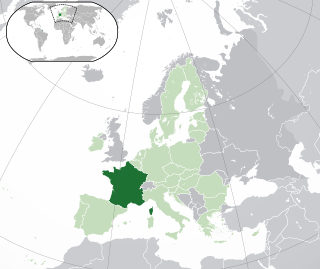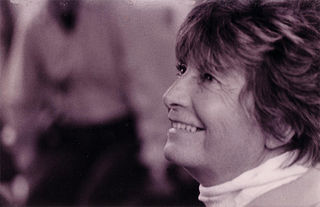
Bernard Sergent is a French ancient historian and comparative mythologist. He is researcher of the CNRS and president of the Société de mythologie française.

Lesbian, gay, bisexual, and transgender (LGBT) rights in France are progressive by world standards. Although same-sex sexual activity was a capital crime that often resulted in the death penalty during the Ancien Régime, all sodomy laws were repealed in 1791 during the French Revolution. However, a lesser-known indecent exposure law that often targeted LGBT people was introduced in 1960, before being repealed in 1980.

Najoua Belyzel is a French pop rock/electronic singer of Moroccan descent.

Guy Hocquenghem was a French writer, philosopher, and queer theorist.

PREF mag or Préférences Mag was a French bimonthly gay magazine founded in March 2004. The magazine was part of Prefmag Editions. The headquarters was in Levallois-Perret. It was a competitor of the magazine Têtu. It was known for its high quality images among other attributes. Although it was a leading prominent and well selling publication for the gay communities it faced criticisms for being politically bland and not embracing non-consumeristic aspirations. They included some more risque content including supportive of LGBT families and open-marriages in line with that of modern French culture. They also were supportive of non-standard views of masculinity and how one's sexuality should conform to traditional models.
The Front homosexuel d'action révolutionnaire (FHAR) was a loose Parisian movement founded in 1971, resulting from an alliance between lesbian feminists and gay male activists. The movement had no official leaders, but Guy Hocquenghem and Françoise d'Eaubonne were among its most prominent representatives, while other members included Christine Delphy, Daniel Guérin, and Laurent Dispot. It had disappeared by 1976. Surviving early activists also include painter and surrealist photographer Yves Hernot, now living in Sydney, Australia.

Eva Cantarella is an Italian classicist. She is professor of Roman law and ancient Greek law at the University of Milan, and has served as Dean of the Law School at the University of Camerino.

Michèle Causse was a French activist, author, and self-described radical lesbian.

Louis-Georges Tin is a French academic, gay rights campaigner, and anti-racist activist. Tin is noted for initiating the International Day Against Homophobia, Biphobia and Transphobia, now marked in over 130 countries across the world, and co-founding the Representative Council of Black Associations (CRAN).

Caroline Mécary is a French lawyer as well as a politician of the Greens party in France. She is also an active member of the Regional council of Île-de-France. A staunch supporter of LGBT rights and gay marriage, Caroline Mécary is also the co-founder of the Copernic Foundation.

Jean-Claude Villain is a French writer. He was born in Mâcon (France) in 1947.
Claude Mossé was a French historian specializing in the history of Ancient Greece.

Paris, the capital of France, has an active LGBT community. In the 1990s, 46% of the country's gay men lived in the city. As of 2004, Paris had 140 LGBT bars, clubs, hotels, restaurants, shops, and other commercial businesses. Florence Tamagne, author of "Paris: 'Resting on its Laurels'?", wrote that there is a "Gaité parisienne"; she added that Paris "competes with Berlin for the title of LGBT capital of Europe, and ranks only second behind New York for the title of LGBT capital of the world." It has France's only gayborhoods that are officially organized.
Gabriel Dussurget was a French impresario and opera director. He was the co-founder of the Aix-en-Provence Festival, an annual summer opera festival in Aix-en-Provence, and served as its Artistic Director from 1948 to 1973. He also served as the Artistic Director of the Paris Opera from 1959 to 1972. He became known as the "Magician of Aix" for his work at the opera festival

Ludovic-Mohamed Zahed is a French-Algerian imam. An openly gay Muslim, Zahed is the founder of an Islamic prayer room in Paris, France, with the goal of accommodating the LGBT and feminist Muslim communities. He also founded the LGBT Muslim association HM2F, and manages the Calem Institute in Marseille.
Roland Étienne is a French archaeologist and historian specialising in the history of Greek archaeology, ancient architecture and Hellenistic history.

Didier Ben Loulou, is a Franco-Israeli photographer.

Stéphanie Michelini is a French actress.

Eliane Morissens was a Belgian teacher and activist. Raised as a feminist, she was active as a trade unionist and socialist. Morissens studied to become a chemical engineer, but was employed as a teacher, as there were few other options for women in her era. She worked her way up to assistant headmistress of a provincial technical college but in 1977 was denied a promotion to become the head of the school. When asked in 1980 to appear on a television broadcast about lesbians, she decided to participate. During the broadcast, she stated that she had been denied the promotion because of her lesbianism. She commented on the irony of the school board being unwilling to put a lesbian in charge of girl students, but having no concern about appointing a man for the post.

Ouissem Belgacem is a French former high-performance athlete and writer of Tunisian origin. He played football for Toulouse FC from the ages of 13 to 18 years old. He published his first autobiographical novel, Adieu ma honte, in 2021. Belgacem often raises awareness about homophobia in the field of football, which he had to leave to live his sexuality freely.
















